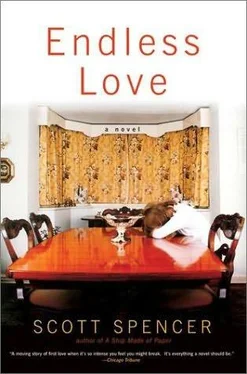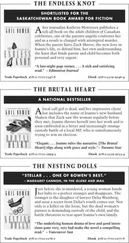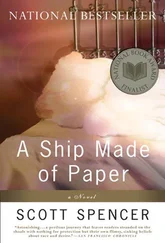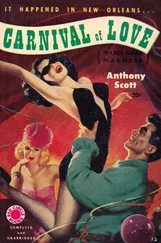I forced myself toward the stairway to the third floor and Keith emerged again. His shirt was pulled over his face and he was coughing and weeping. I called out to him and he staggered toward me as if he’d been pushed from behind. My face was so hot I slapped at it, thinking in a panicky instant that my skin had caught fire.
“Please,” moaned Keith. “I can’t see and I don’t know what to do.”
I scuttled over to him. Keith had one arm over his eyes now and his long, thin legs bent at the knee. His other arm still reached out toward me—though I don’t know if he realized who I was. I grabbed his hand and tried to pull him down to the floor; he stiffened as if I’d shot him through with electricity.
I shouted his name as loudly as I could and pulled again. He yanked loose of me and stepped back, like a spirit preparing to disappear into the ether.
I struggled to my feet and reached out for him. He looked at me with a momentary flash of recognition.
“Take my hand goddamnit,” I shouted. “Take it!”
Keith stared at me and took another step back. I was terrified that at any instant he would burst into flames as Sammy’s door had, a human nova. I lunged for him and as I grabbed his shoulders I felt the strength leave his body. His legs buckled and he swooned into my arms. It was dead weight and I was not really equal to it. I staggered back but Keith kept coming; his forehead banged into me, his bony chest slumped against mine, and in a moment we were both on the smoking floor, he on top of me, and now my heart was wild, beating at an incredible rate as if to compensate for the eternity in which it would remain still.
And then I heard someone pounding up the stairs. I turned my head to see Hugh rushing toward us. He was roaring Keith’s name. His ferocity was nearly as awesome as the fire; even through the smoke, his eyes shone with paranormal intensity. And though I knew that Hugh had come back to rescue Keith, as he came charging up the stairs I could not help but fear that he was coming after me—not to rescue me, of course, but to take my head between his strong capable hands and crush it. Like a madman, Hugh raised his arms above his head, breathed deeply through his clenched teeth, and brought his hands down on Keith’s back to lift him up as easily as if Keith were a sack of feathers.
It was the last thing I saw. Limply, with no more than instinct’s shadow, Keith tried to hold on to me as his father lifted him up, and with that faint plucking at my shirt I lost all consciousness. The world began to ooze away from me. The last thing I saw was Hugh looking down at me and then I felt his hand on my wrist. It wasn’t until he testified against me that I learned that Hugh had carried me down slung over his shoulder (with his arm around Keith, who sobbed and stumbled at Hugh’s side) and brought me outside, where the firemen were finally arriving, their sirens whooping and the red lights skittering through the trees. To his everlasting regret, Hugh had saved my life.
I confessed it was me who’d started the fire while I was in the Jackson Park Hospital. (The Butterfields were being treated in the same hospital but I shared my room with strangers.) I told the first people I saw the next morning, which means that in the ambulance, the emergency room, and all through the night, while I drifted in and out of consciousness, I concealed that central fact. But when “I woke the next morning to find my parents sitting in folding chairs—Rose with her legs crossed and her fingers drumming on her patent leather purse, and Arthur with his large head bowed and needlepoint drops of perspiration in the bands of scalp that divided his thinning hair—I cleared my throat and said, “I started the fire.”
They both sat up and looked at each other, and then Rose leaned forward, pursing her small full lips and shaking her head. “Shut up,” she whispered, and she glanced with conspiratorial panic at my two sleeping roommates. But I wasn’t about to leave myself open to the horrors of detection and from that moment began a process of confession, defense, and punishment that was to dominate my life for years.
My father is what people call a “left-wing lawyer.” By 1967, both he and Rose had been separated from the Communist Party for fifteen years, but he was still a left-wing lawyer—meaning that he would never defend a rich man against a poor man and he didn’t charge his clients fancy fees. Arthur aged faster than he should have from the long hours he put in at work. He often stayed in his office until midnight and once—this was a story Rose liked to tell about him—the lightbulb in his desk lamp popped and went black and Arthur continued to sit there in his feeble, whinnying swivel chair writing down on his long yellow legal pad an inspired line of inquiry he wanted to pursue in an accident case. He was afraid that if he got up to switch on the overhead light, he might lose the rhythm. The next day, checking over his notes—now if this were a joke, they’d have been nonsense or illegible, but the three pages of blindly transcribed ideas were perfectly readable and absolutely essential to the case. It wasn’t something as bloodless as addiction to work that made Arthur put his whole heart into every case: Arthur truly longed to defend the weak against the strong. He wanted this more than money, more than glory, more than comfort. Sometimes his passion to save his clients destroyed him in court. He often grew angry and his voice would crack like an adolescent’s if he sensed a case slipping away from him.
Arthur wanted to handle my case, just as a surgeon would need to perform a vital operation on a loved one. But this was clearly out of the question: with the charge of arson and reckless endangerment wrapped around me like a hideous ceremonial robe, I certainly needed someone more plausible to plead my defense than my own father. Arthur had done his share of favors, and when it became clear that the full complexity of wrongdoing was to be mine to untangle, two of his friends stepped forward and offered to take my case for free—Ted Bowen, whom I’d known all my life, and Martin Samuelson, who was treated by my parents as a transcendent hero of intelligence and nerve, a dialectician extraordinaire, a man who could quote Engels with the same lyrical brilliance as he could cite Hugo Black and whom my parents, in a holdover from their Party days, considered more important than they themselves, so that his interest in my case was greeted with stunned gratitude.
Briefly, the sequence of events was this. I was arrested in the hospital and placed, without hearing, in a juvenile detention center on the West Side. There was a great deal of haggling between the police, the district attorney’s office, and my lawyers over what my legal status was: the question was if I would stand trial as an adult or be treated as a juvenile offender. I was seventeen and Martin Samuelson—this was his major effort; he soon wearied of the case and he especially grew tired of me—was successful in defining me as a juvenile so my fate would be decided not before a jury but in judge’s chambers. By now, I was out of the juvenile detention center and undergoing a marathon sequence of psychological examinations—they seemed to be a mixture of Scholastic Aptitude Tests and the kind of baffling, embarrassing questions a cornball pervert might ask a child in a schoolyard. I gave my impressions of inkblots, added columns of three-digit numbers, identified pictures of Washington, Lincoln, and Kennedy, and answered True or False to questions like: “I feel I go to the bathroom more than other people.” I went through this process of psychological testing twice, the first time at the hands of a court-appointed psychologist. Then Ted Bowen arranged that I’d be retested by a private psychologist. This was Dr. White, a gentle old man with conjunctivitis. (Dr. White was the first doctor I’d ever been to who wasn’t a personal and political friend of my parents: the Party created its share of internists and dentists but few psychiatrists.)
Читать дальше












